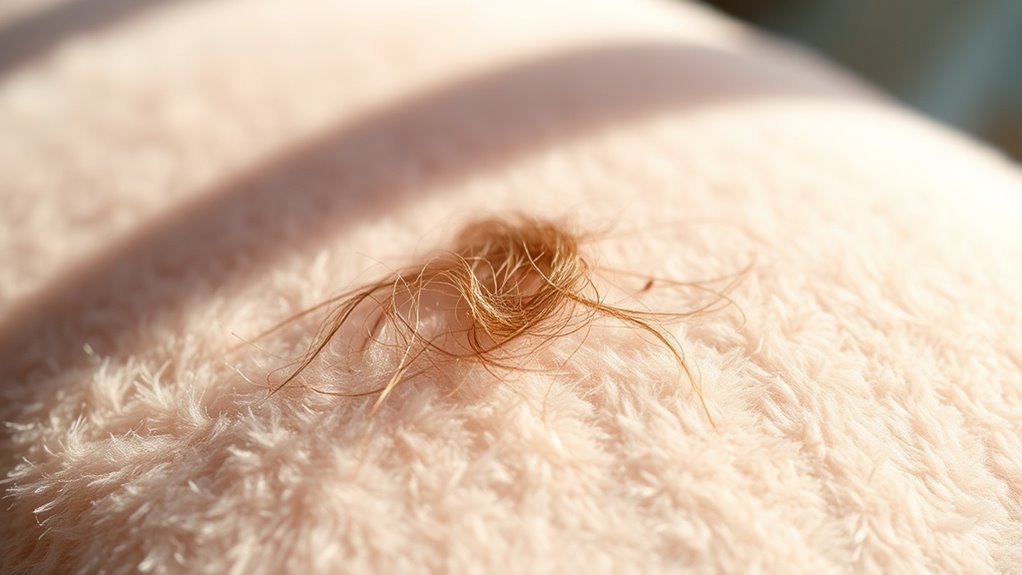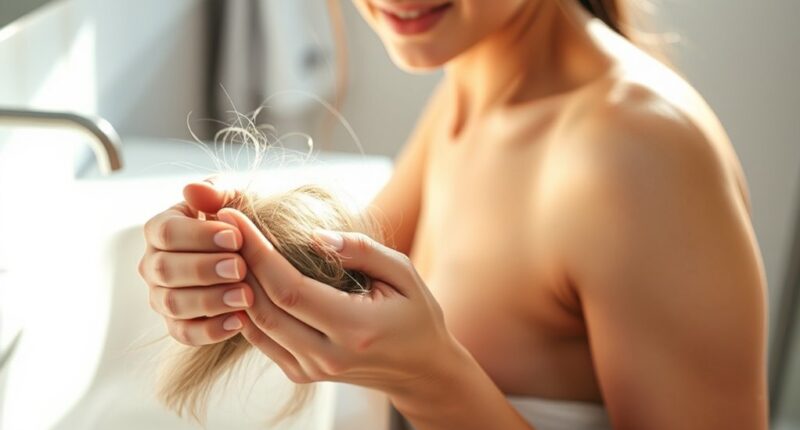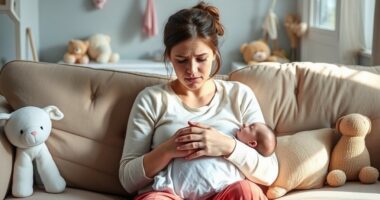Postpartum hair loss is a common, temporary reaction to hormonal changes and nutritional depletions after pregnancy. As estrogen levels drop, you may notice more shedding, especially around three to six months postpartum. To cope, focus on a balanced diet rich in iron, zinc, and vitamins like biotin and vitamin D. Use gentle hair care and manage stress for better recovery. If you want practical tips to handle this phase, there’s more you can do to support your hair’s health.
Key Takeaways
- Postpartum hair loss is common due to hormonal shifts, especially the rapid drop in estrogen after pregnancy.
- It usually peaks around three to six months postpartum and gradually improves as hormones rebalance.
- Nutritional deficiencies and stress can worsen shedding; maintaining a balanced diet and managing stress aid recovery.
- Gentle hair care practices and avoiding heat styling help minimize further hair damage.
- Patience and time are essential, as postpartum hair loss is temporary and typically resolves without medical intervention.

Have you noticed more hair shedding than usual after giving birth? If so, you’re not alone. Postpartum hair loss is a common experience for many new moms, and understanding what’s behind it can help ease your worries. The main culprits are hormonal fluctuations and nutritional deficiencies that happen during and after pregnancy. During pregnancy, your body produces high levels of estrogen, which helps keep hair in the growth phase, resulting in thicker, shinier hair. After delivery, estrogen levels drop sharply, causing many hair follicles to enter the shedding phase simultaneously. This sudden change leads to noticeable hair loss, often most apparent around three to six months postpartum. It can be startling, but it’s a normal part of your body’s recovery process.
Hormonal fluctuations are the primary reason for postpartum hair loss, but they aren’t the only factor. Your body is also adjusting to new routines, sleep deprivation, and the physical demands of caring for a newborn. These stresses can exacerbate hair shedding and make the situation feel more overwhelming. Meanwhile, nutritional deficiencies can play a significant role as well. Pregnancy often depletes essential nutrients like iron, zinc, and biotin, which are essential for healthy hair growth. If your diet isn’t replenishing these nutrients adequately, you might notice increased hair shedding or thinning. Sometimes, postpartum fatigue and poor eating habits make it harder to restore nutrient levels, prolonging the hair loss period. Additionally, incorporating proper hair care practices can help minimize damage and support your hair’s recovery during this time.
The good news is that postpartum hair loss is usually temporary. Your body needs time to rebalance hormone levels and rebuild nutrient stores, so patience is key. You can support your recovery by maintaining a balanced diet rich in iron, zinc, and vitamins, especially biotin and vitamin D. Staying hydrated and avoiding crash diets or restrictive eating habits also help. Gentle hair care practices are essential—use mild shampoos, avoid excessive heat styling, and resist the urge to pull or yank at your hair. Stress management techniques like light exercise, meditation, or simply resting when you can make a difference, too.
Frequently Asked Questions
Can Postpartum Hair Loss Be Prevented Entirely?
You can’t prevent postpartum hair loss entirely because hormonal changes are inevitable after childbirth. However, you can support your hair health by maintaining hormonal balance through proper rest and managing stress. Dietary adjustments, like increasing iron, zinc, and biotin intake, also help strengthen your hair. While these steps won’t stop hair loss completely, they can minimize its severity and promote healthier hair recovery during your postpartum journey.
How Long Does Postpartum Hair Shedding Last?
Postpartum hair shedding usually lasts about three to six months after your baby’s birth, as your body adjusts to hormonal changes. During this time, you’ll notice increased hair shedding, which is normal. It’s your body’s way of resetting hormone levels. To manage this period, maintain a healthy diet, gentle hair care, and stay patient. Usually, your hair will start to regrow as hormone levels stabilize around the six-month mark.
Are There Safe Medications for Postpartum Hair Loss?
You might wonder if there are safe medications for postpartum hair loss. While hair loss remedies like minoxidil aren’t recommended during breastfeeding, many safe options exist. Always consult your healthcare provider to guarantee medication safety before starting any treatment. They can suggest gentle solutions, such as topical treatments or lifestyle changes, that support hair regrowth without risking your or your baby’s health. Prioritize professional guidance to find what works best for you.
Does Breastfeeding Affect Postpartum Hair Loss?
Breastfeeding hormones can influence postpartum hair loss, but they don’t directly cause it. These hormones may temporarily affect your hair growth impact, making hair thinning more noticeable during breastfeeding. However, everyone’s experience varies, and hair loss often results from a mix of hormonal shifts, stress, and genetics. Focus on maintaining a healthy diet and gentle hair care routines to support your hair health during this time.
When Should I See a Doctor About Hair Loss?
Think of your hair as a delicate garden—you’ll want to tend to it before weeds take over. You should see a doctor if your hair loss worsens, persists beyond six months, or causes emotional distress. They can recommend effective hair loss remedies and tailored hair care tips. Don’t wait for the problem to grow out of control; early intervention keeps your confidence blooming.
Conclusion
Remember, postpartum hair loss is temporary and part of your body’s natural process. While it can be frustrating, trust that your hair will grow back with time and proper care. Stay patient and gentle with yourself—you’re doing an amazing job. As the saying goes, “This too shall pass.” Keep nourishing your body and embracing your journey; brighter days and fuller hair are on the horizon.









